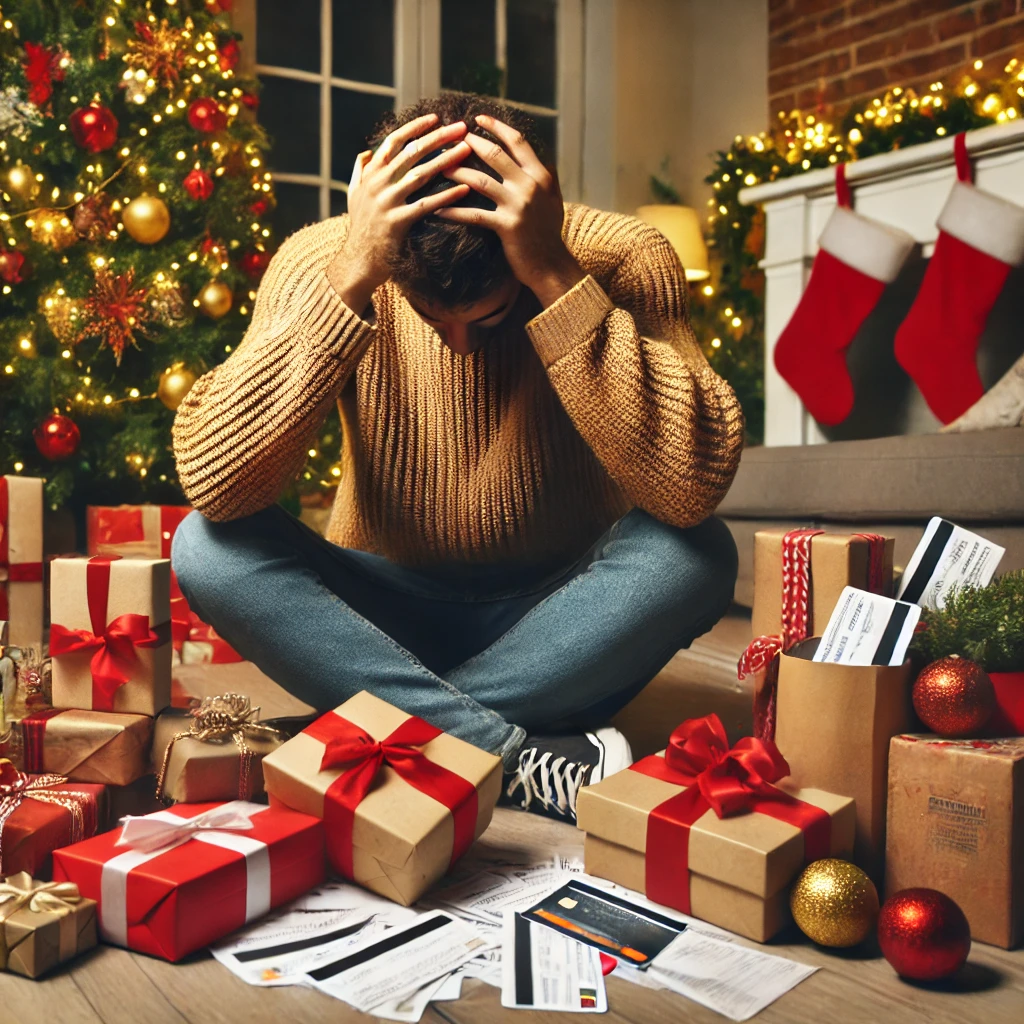
The holiday season, often regarded as a time of joy and togetherness, presence not presents, right? Well not so fast, The Christmas holiday has taken on new complexities in the aftermath of the pandemic – wait am I allowed to say that? On my Youtube Channel, I cannot, (ijs, LOL). While many eagerly anticipate reconnecting with loved ones and returning to cherished traditions, the lingering effects of the past few years have reshaped how we approach this time of year.
Financial expectations, heightened social expectations, time expectations and emotional expectations weigh heavily on us as we attempt to navigate a season that has become as demanding as it is celebratory. For some, the strain of meeting these expectations overshadows the joys of the holiday, leaving many of us feeling overwhelmed, disconnected and depleted.
One challenge that has left lasting marks on how we celebrate is economic instability, amplified by inflation, which has made gift-giving and festive gatherings more stressful than ever. The rising cost of fuel, plane tickets, and hotel accommodations has further strained budgets, making travel to see loved ones or host out-of-town guests an even greater financial burden.
These increased expenses force many of us to make difficult decisions about prioritizing family connections or cutting back on traditional holiday activities, like buying a tree as opposed to cutting one down or searching Google to find the cheapest fake tree on sale, adding another layer of stress to an already demanding season.
Compounding these pressures are the emotional scars left by loss—whether of loved ones, traditions, or a sense of normalcy. These factors have forced many to reevaluate what the holidays mean, balancing the weight of expectations with a desire for meaningful connection and reflection. All of which has been weighing on me since the very first Christmas movie from the Hallmark Countdown to Christmas series began back in October – wait what? Exactly!

Here we go again, expecting the unexpected. Yes, many will feel the most stress over the Christmas holiday season. I’ll list the top 4 expectation stressors and explain how to best manage them.
Expect the Unexpected – Not every moment needs to be magical to be meaningful. Pay attention to these:
1. Financial Expectations
After dealing with economic uncertainty, job losses, and inflation, many still feel the pressure of buying gifts. Definitely social media amplified. Let’s be real, the expectation to buy more stuff, despite financial constraints is heavily influenced by our influencers. I know, I was on that journey before I hit the minimalistic way of living. And I have to truly say, I miss NONE of it… the stuff that is :-).
Most of us know, financial stress can wreck havoc on the mental and forget about the physical. Financial stress is a catalyst for poor sleep. Constant worry about bills, debt, or income instability can lead to insomnia or restless nights. Over time, this lack of sleep will cause fatigue, reduce cognitive function, and increase irritability, making it harder to manage daily tasks. Or for anyone to stand to be around you.



From a scientific perspective, stress triggers an increase in the hormone cortisol, yada yada yada but wait, the headaches, digestive issues, and even heart problems are all brought on by this high level of uncontrolled stress. Chronic financial stress links to high blood pressure and a weakened immune system, making us more vulnerable to illness. While the saying “more money, more problems” holds some truth, the opposite is equally valid—having little or no money often leads to even greater challenges and stress, creating a cycle that can be difficult to break.
Emotionally, financial stress can lead to feelings of anxiety, depression, and hopelessness. Constantly feeling overwhelmed by financial problems erode self-esteem and cause a sense of powerlessness, especially if feeling financially stuck, The fear of not being able to meet financial obligations, such as paying rent, mortgage, car note/insurance or putting food on the table, can create persistent feelings of dread. Hindering an individuals ability to make sound decisions as anxiety seeps in clouding judgements.
This is when many of us start to engage in unhealthy coping mechanisms, such as overspending on credit cards, avoiding financial responsibilities, over eating and or drinking and/or relying on other substances to numb the pain. Some may withdraw socially, avoiding friends or family due to embarrassment or sham.
What can you do to change this… You first must have. a willingness to shift your expectations. Alleviating financial stress around the holidays requires planning, prioritization. It starts with setting a realistic budget and sticking to it, focusing on what you can afford rather than external expectations. If you absolutely have to shop, try shopping early, take advantage of sales throughout the year or discounts. Doing this will reduce last-minute financial strain. Example, Black Friday Shopping – over spending because you think it’s a deal. It could be a deal but you only recognize that when you’re not rushed.
Next, start to simplify celebrations by prioritizing meaningful connections such as potluck gatherings, baking and watching holiday movies with friends and/or family. Embrace the idea that the holidays are about creating memories, not accumulating more stuff. Embarking on some of these ideas won’t guaranty your holiday to be totally stress-free but I promise, it will feel much more full-filling.
2. Social Expectations

There’s already societal pressure to find the perfect gift. Many still worry about disappointing loved ones or feeling inadequate if they can’t afford gifts. Social expectations during the holidays can significantly have an impact causing stress and anxiety as we strive to meet societal standards of what a “perfect” holiday should look like. Is this you? Why do you care, ask yourself. If it doesn’t bring you joy, why do you care. This should be the time to insert the “no fucks to give” attitude. Your focus needs to be on the spirit of presence not presents.
Ask yourself, does the “perfect holiday” of creating joy and moments of togetherness involve the need to buy for gift-giving, hosting large family gatherings, lavishly decorating the home with Christmas decor and attending multiple events to places you really aren’t feeling? Well, if this is you, I can almost certainly guaranty this “perfect holiday” thinking will leave you overwhelmed, stretched thin and depleted making it difficult to enjoy the holiday season in a way that feels authentic.
Again, social media amplifies these expectations, exposing many of us into carefully curated posts showcasing seemingly perfect holiday experiences. The pressure to compare one’s own celebrations to these idealized versions can lead to feelings of dang mine don’t look like that. There are no “norms” of a perfect or successful holiday. Prioritizing meeting external expectations over your own well-being is just reckless and will lead to burnout and/or resentment instead of relaxation and enjoyment – trust me.


Start by setting realistic goals and boundaries around what you can manage. Recognize that you don’t have to meet every societal or familial expectation to have a meaningful Christmas holiday. Focus on what matters most to you and let go of the pressure to create a “perfect” holiday, it doesn’t exist.
Another effective way to reduce stress, consider focusing on experiences rather than stuff and gifts. You could even start a new low-stress tradition such as volunteering or spending a quiet evening watching holiday movies, that’s my plan this year. Me Myself and I is plenty. Remind yourself that the holidays are about connection and gratitude, not perfection. Shifting your mindset and focusing on what feels authentic to you can help diminish the weight of social expectations and allow you to enjoy the season on your own terms. That’s my fav slogan “On My Own Terms”. Think I’m going to skip putting a tree up.
3. Time Constraint Expectations
Holiday seasons are typically busy, we have work, family obligations, and social events. Finding time to shop, especially when working from home or juggling multiple commitments, adds stress. It can become overwhelming balancing work, holiday shopping, family gatherings, and other social events. Christmas is one month, can’t do it all so stop cramming and start strategically planning your time with a calendar.

The pressure to fit everything in within a limited timeframe often leads to a packed schedule, making it difficult to relax or focus on self-care. As tasks pile up, you may feel there is not enough time to enjoy the holidays or to spend quality moments with loved ones. Oh there’s time, but not unless you make it.
For me, Time constraints affect the quality of my holiday experience. I don’t find joy in rushing through gift shopping, decorating or skipping over meaningful traditions in order to meet deadlines or attend multiple events. This hurried pace diminishes the joy of the season for me and probably most of you. Simply ticking items off a checklist rather than truly savoring the spirit of the holiday feels too routined.


To avoid getting stuck in a feeling of repetitive daily routines and feeling disconnected from the meaningful aspects of the holidays, it’s essential to prioritize and set boundaries around your time. Start by identifying the most important traditions or activities that bring you joy and connection during this time of the year and then focus on those while letting go of nonessential tasks and/or events.
Create a realistic schedule that includes moments of downtime for self-care and reflection, such as taking a quiet walk, journaling, or spending undistracted time with loved ones. If you must throw the lavish decor parties try to delegate tasks where possible—whether it’s asking for help with cooking, shopping, or decorating. Keep in mind and embrace the idea that simplicity can be just as meaningful as extravagance. Carve out time for connection and reflection, so you can reclaim the spirit of the holidays and experience the season with greater peace and fulfillment. If you don’t want to do it, don’t do it.
4. Emotional Expectations
The weight of holiday traditions and the desire to create meaningful experiences can turn acts of generosity into stressful obligations. Emotional holiday expectations often place heavy burdens on individuals, as many feel the need to orchestrate perfect, joyous experiences for themselves and their loved ones. There’s that word again, I guess it boils down to what “perfection” means to you.
Again, this pressure is heightened by societal and cultural influences that glorify picture-perfect celebrations, leaving many feeling overwhelmed when reality falls short. For some, this emotional toll is compounded by the loss of family and friends and/or the lingering effects of financial struggles as many of us have not fully recovered from the pandemic. The emotional strain of trying to uphold traditions or make others happy can overshadow the ability to enjoy the season and lead to resentment or burnout.
Furthermore, emotional expectations can heighten feelings of loneliness or isolation, especially for individuals who have experienced loss, separation, or family conflict. The holidays intensify emotions as people reflect on the “ideal” family dynamics and feel alienated if they do not align with those images.
The desire to feel connected to loved ones or to create meaningful memories can lead to stress if those relationships are strained or if there is pressure to maintain harmony despite underlying tensions. This emotional strain can result in anxiety, depression, and a diminished sense of well-being during what is supposed to be a time of celebration. If you are not smiling and laughing you’re not enjoying any of it.











Avoiding emotional expectations during the Christmas holiday starts by letting go the need for perfection. Focus on what genuinely brings you joy and laughter. Acknowledge that it’s okay if the season doesn’t match the idealized images often portrayed in movies or on social media.
Set realistic expectations for yourself, understanding that not every moment needs to be magical for the holidays to be meaningful. Practice gratitude by focusing on what you have rather than what’s missing. Create new traditions that align with your current reality rather than clinging to outdated ones.
Surround yourself with supportive people who uplift your spirit. Give yourself permission to decline activities that feel more like obligations than sources of happiness. By prioritizing self-care and authenticity, you can embrace the holidays with less pressure and more peace. Smile, you got this.
RELATED POSTS
View all



